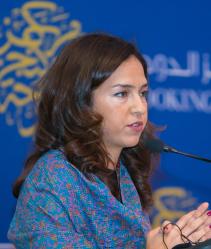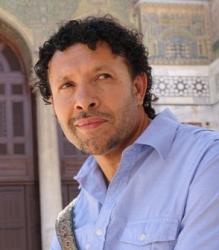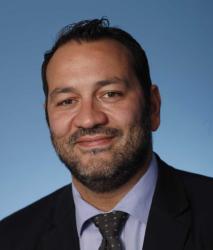Content from the Brookings Doha Center is now archived. In September 2021, after 14 years of impactful partnership, Brookings and the Brookings Doha Center announced that they were ending their affiliation. The Brookings Doha Center is now the Middle East Council on Global Affairs, a separate public policy institution based in Qatar.
On June 5, 2017, the UAE, Saudi Arabia, Egypt, and Bahrain severed their ties with Qatar, beginning a year-long blockade against the Gulf country. With claims that Qatar’s policies fueled terrorism, maintains friendly relations with Iran, and meddles in the internal affairs of their countries, a list of 13 demands was presented by the blockading countries, which Qatar considered as an attack to their sovereignty. On the one-year anniversary of the continuing GCC crisis, Brookings experts reflect on its challenges and discuss its impact in the region.
Tarik Yousef—Director, Brookings Doha Center: One year into the Gulf Cooperation Council (GCC) crisis, the accumulated impact of the rift within the Arab world’s historically most predictable and stable grouping is a massive loss in collective international standing, geopolitical influence, and economic weight. The long-term damage to the GCC’s economic and financial integration project cannot be overemphasized. Considerable harm has also been inflicted on the bloc’s biggest asset: its social bonds and cultural fabric.
The Arab regional order has experienced growing strains in the past decade, and its collapse now appears complete with the breakdown of the GCC. Future integration projects must await the end of regional conflict and internal strife, which will give rise to the gradual emergence of a new regional architecture. Unlike the past, the new security arrangements will need to accommodate heightened concerns over political sovereignty and economic independence by member states, as well as the expanded presence, influence, and ambition of non-Arab powers in the Middle East.
Nader Kabbani—Director of Research, Brookings Doha Center; Senior Fellow, Global Economy and Development: One year ago, the United Arab Emirates(UAE), Saudi Arabia, Bahrain, and Egypt surprised the world by cutting off diplomatic and economic relations with their neighbor Qatar. The main issue was Qatar’s independent foreign policy, which was increasingly at odds with that of its neighbors. The quick and decisive action was a gambit aimed at forcing Qatari capitulation. The gambit did not go as expected. Qatar to date has been able to successfully weather the boycott, both politically and economically. It also wisely refrained from escalating the conflict and has taken steps to address many of the concerns raised against it.
One year on, there is little to be gained in continuing the boycott and much to lose. Saudi Arabia is in the middle of a challenging social and economic transformation; Dubai is preparing to host the World Expo in 2020; and Bahrain is working hard to stave off a financial crisis. A civil war rages on in Yemen, and Iranian influence in the region continues to expand. There is far more that unites the Gulf states than separates them. They need to end the conflict and work together to overcome the challenges they all face.
Noha Aboueldahab—Visiting Fellow, Brookings Doha Center: One year on, it has become clear that the blockade of Qatar is part of a much larger puzzle: a Saudi and UAE-led re-designing of the geopolitical landscape in the region, supported by the United States. The Saudi-Iranian rivalry certainly represents a significant driver of tensions in the Gulf. However, other factors must also be taken into account if we are to understand the broader implications of the GCC crisis.
In the last few years, several Gulf states, Turkey, and China have expanded their political and military influence in the Middle East, the Horn of Africa, and beyond. This expansion has intensified since the blockade and points to a battle for power and control through neo-colonial tools, wielded by actors within the region and outside it. Meanwhile, a divided Gulf has meant worsened prospects for regional security. But worst of all, it means that a resolution to the war in Yemen, which has produced the world’s worst humanitarian crisis, continues to be elusive.
Larbi Sadiki—Nonresident Fellow, Brookings Doha Center: Since ancient times, the history of statecraft has been littered with blockades. Blockades are not wild fruits of irrational actors; they belong to a realist calculus of power, whereby cunning statesmen and political artisans seek to subdue their opponents. They have one key significance: war by other means.
Contemporary blockades, with their varying degrees of severity, have demanded legally and morally binding and enforceable rules of engagement. This provided much room for exuberant political imagination to widen the scope of a nation’s responsibility to protect its civilians and cities. Such monitoring is one instrumentality available to the international system to fend off a central notion of high power politics. Lest we forget, the Arab world has long felt the devastation wrought by the “strong.” The 1990-2003 blockade against Iraq ravaged civilians. The ongoing siege of Gaza, now ten years old, blights the lives of two million human beings. The Qatar blockade that begun a year ago leaves much to be desired with respect to its propriety, and unanswered questions as to its ends. But so far Qatar has been fortunate enough to be able to invest skill and money in absorbing the shocks, more or less reducing the situation to a blockade in name only.
Ranj Alaaldin—Visiting Fellow, Brookings Doha Center: The Gulf Crisis shows no sign of being resolved anytime soon. Ongoing U.S. indifference and acquiescence to the Quartet’s blockade risks making this crisis the new normal. This does not bode well for a region already engulfed in political and violent instability. Qatar has proven resilient to the blockade, in large part because of its economic wealth, as well as its status within the regional and international political and economic order. History also shows that blockades simply do not work and, if anything, the Gulf crisis and Qatar’s defiance has reinforced Qatari sovereignty. The crisis has created a strategic void that could be filled and exploited by Iran at a time when the United States is moving closer toward a military confrontation with Iran and its proxies. Now more than ever, the United States needs a unified Arab world.
Galip Dalay—Nonresident Fellow, Brookings Doha Center: When the Gulf crisis occurred, Turkey found itself in an uncomfortable position. Its immediate preference was to not appear anti-Saudi Arabia. It even offered support in mediation efforts. However, the blockading countries viewed Turkey as decidedly in the same camp with Qatar. This convinced Turkey that the Gulf crisis was not an isolated incident occurring on a bilateral level between Qatar and Gulf-Arab countries. Instead, it saw this feud as a continuation of the fractures and cleavages that were generated by the Arab Spring. Moreover, Turkey perceived that the ultimate goal of this blockade was to either topple the Qatari government or to render it subservient to the blockading countries.
These states had a vision for a new regional order, which was, if not outrightly hostile to Turkey’s regional presence, it was inimical to Turkey’s regional interests. Turkey has thus thrown its full weight behind Qatar in various ways. Firstly, it aimed to lessen the impact of the blockade on Qatar by creating an air bridge for needed supplies. Secondly, it deepened its political and strategic ties with the country, particularly by enhancing its military capacity in its Qatar base. Thirdly, Turkey pursued a policy of improving ties with Kuwait and Oman and maintaining a channel of communication with Saudi Arabia.
As time passes, Turkey fears that the current situation will become the Gulf’s new normal. The blockade is likely to cause Qatar to become more introverted and downsize its regional involvement. Only through a strenuous U.S. pressure and diplomacy, the blockading countries can reverse the course, which unfortunately does not seem to be forthcoming in earnest.
Ali Fathollah-Nejad—Visiting Fellow, Brookings Doha Center: The year-long blockade against Qatar has provided Iran with an unexpected, strategic opportunity. The GCC’s quasi-collapse, as a result of the ongoing blockade and various unsuccessful attempts to put an end to it, has incapacitated Iran’s most potent Arab regional contender – a surprising godsend for Tehran. While Qatar and Iran enjoyed good relations in the past, especially due to their sharing of the world’s largest gas field, the blockade has catapulted bilateral ties onto a new level. Since the start of the blockade, Iran has not only increased its exports to Qatar, but both countries have also boosted air and marine transportation, while also improving financial ties.
Iran has also opened up its airspace for Qatar Airways operations and its land territory for Turkish exports to Qatar. Iranian officials have, time and again, emphasized Tehran’s key role in standing by Doha since the blockade started. To this day, the extent of Iran’s security assistance remains obscure. Altogether, the blockade continues to push Doha closer to Tehran – a process that, paradoxically, the blockading states both enable and lament.
Adel Abdel Ghafar—Fellow, Foreign Policy, Brookings Doha Center: As the GCC crisis enters its second year, there is already a clear winner: the arms industry. In the past nine months alone, the United States secured $54 billion in weapons sales to Saudi Arabia, including Harpoon Block II missiles, Chinook helicopters, frigates, terminal high-altitude area defence (THAAD) systems, and various other weapons and precision munitions. The UAE continues to spend billions buying weapons not only from the United States and Europe, but also from China, using Chinese drones in Yemen with devastating effect. Bahrain has signed a 3.8 billion deal to purchase American F-16 jets, missiles, and patrol boats.
Qatar, under siege by its neighbors, has also drastically increased its arms purchases. Since the crisis erupted, their purchases have included 36 American F-15 jets, 12 French Rafale jets, Italian warships, German tanks, and 24 Typhoon jets from the United Kingdom. Despite this increase in defense capabilities, there are questions over the ability of the Qatari armed forces to fully utilize these capabilities given their limited manpower.
Besides increasing their military capabilities, GCC states have used weapons purchases as a form of checkbook diplomacy to shore up alliances with various international partners, especially the United States. While the Departments of State and Defense have pressed for an end to the crisis, President Trump will be more than happy to continue selling weapons to all sides as the crisis continues.










Commentary
Op-edWhat Brookings experts are saying about the one-year anniversary of the Gulf crisis
June 4, 2018